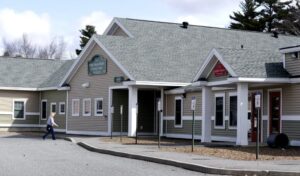“If you can’t get what you need, we’re here,” was the message Joe Kreisler wanted people experiencing poverty to hear when he founded High Street Resource Center (the organization that evolved into Preble Street) in 1975.
The grand opening of
Florence House
Sign for the original High Street Resource Center
Mark Swann, Bruce Logan, and Joe Kreisler share a smile in the early 1990s.
“I see the work that Preble Street does in the context of what’s changed in the human service arena in the last 30 or 40 years,” says Mark Swann, Preble Street Executive Director. “There are a few reasons we are still here, when so many other organizations have closed their doors. One is that we stay true to our mission. Partnerships, especially those partnerships that help us advance towards a more equitable Maine, are as key to our future as they have been to our past.”
“We have built a lot of trust within our community, which leads to really impactful private funding support,” adds Swann. “That support has helped us to stay adaptable, flexible, and responsive in the face of new challenges. And by pivoting or expanding when needed, it’s helped us to develop new relationships, new possibilities, and new opportunities.”
Advocacy is a key component of social work and the Preble Street mission. “Social work is about relationships – our relationship with one another and our relationship with community,” shares Daniella Cameron, Preble Street Deputy Director. “It’s also about bringing people together to promote change through collective action and to address the inequities inherent in systems both large and small.”

Social workers advocate for clients every day as they help them access healthcare, housing, and social services. While this type of advocacy is extremely impactful for individual lives, it does not address the complex systemic problems that lead to hunger, homelessness, and poverty. By embedding advocacy for solutions to the Preble Street mission, we focus on challenging the unjust systems that create barriers for individuals. “For all of the complexity of the problems we are working on, what Preble Street does is relatively simple – we are addressing food insecurity and the need for shelter, housing, healthcare, and stability,” says Ali Lovejoy, Vice President of Mission Advancement.
“Preble Street solves these really big problems through advocacy, by developing partnerships or innovative programs, by investing in our dedicated staff, and thanks to the efforts of thousands of volunteers and donors over the past 50 years. We could not do what we do without the community’s support – which now includes the entire state.”

During an emotional presentation at the Second Preble Street Conference on Homelessness in October 2024, Michelle Ducas shared about the impact that Preble Street has had on her life.
“Today I stand here, two weeks away from being one year sober, and if I were still homeless while all of this happened…if not for the Housing First Program…if not for my friends, the staff at Huston Commons…
For 50 years, Preble Street has been driven to put compassion in action. And the agency is going to continue to do that, to meet the need and to meet people where they are. “We’re going to grow Site-based Housing First in Maine to end chronic homelessness. We’re going to work towards our goal of preparing up to 10,000 meals a day for food insecure Mainers across the state. And finally, we will soon be able to bring our youth shelter and day center together under one roof at Joe’s Place,” says Swann. “Knowing that we have the support of our community is what keeps me hopeful for the future and for a Maine where the most vulnerable people have their basic needs met.”
We do not know exactly what new challenges our communities, state, and nation will be facing in coming years. But we do know, as we head into our sixth decade as a social work agency committed to ‘empowering people experiencing problems with homelessness, housing, hunger, and poverty, and advocating for solutions to these problems,’ that we are preparing to meet those challenges. As Joe said, “If you can’t get what you need, we’re here.”

Thank you, volunteers!
The dedication, compassion, and hard work of Preble Street volunteers make a profound impact on the lives of those we serve. This year, we’ve had over 1,300 individual volunteers contributing nearly 20,000 volunteer hours. Our volunteers make time in their busy schedules and come out in all kinds of challenging Maine weather to make a positive

Preble Street Board Profile – Elaine Rosen Curbside Winter 2024/2025
How did you first get involved with Preble Street? I chaired the Greater Portland United Way Campaign in 1997 and toured every agency. The one that impressed me the most was Preble Street. What do you do when you’re not at Preble Street? I sit on corporate boards and investment committees; I spend time with

The first 24/7 Preble Street program in Bangor
A sad reality of emergency shelters is that they are always at risk of closing their doors. Over the past fifteen years, at least nine shelters in Maine have closed due to funding issues. Site-based Housing First is the long-term permanent housing solution for many of the people in Maine experiencing chronic homelessness, but until the

